Russia brushed off U.S. President Donald Trump‘s latest comments about further sanctions over the war in Ukraine, saying they have “no effect whatsoever” and are “absolutely useless.”
Trump told reporters on Sunday, September 7, that he was ready to move to the next phase of sanctions against Russia. He had threatened secondary tariffs on major Russian trading partners and other sanctions if Moscow did not make peace with Ukraine soon.
Since then, the war has continued, and over the weekend Moscow launched its largest aerial attack to date. A Ukrainian government building for cabinet ministers was hit for the first time during the attack.
Dmitry Peskov, spokesman for the Russian President Vladimir Putin, blamed Kyiv and its European allies for keeping more sanctions at the forefront of the agenda for Washington.
“Overall, one thing can probably be said: This unprecedented number of sanctions that have been imposed on our country over the past—well, it’s already almost four years, now four years—have had no effect whatsoever,” Peskov told Russian Alexander Yunashev.
“They have proven absolutely useless in terms of putting pressure on Russia,” Peksov said, originally in Russian, in a video posted to the Yunashev LIVE channel on Telegram on Monday morning.

Russian President Vladimir Putin speeches during the plenary session of the 2025 Eastern Economic Forum, on September 5, 2025, in Vladivostok, Russia.
Russian President Vladimir Putin speeches during the plenary session of the 2025 Eastern Economic Forum, on September 5, 2025, in Vladivostok, Russia.
Contributor/Getty Images
Zelensky Urges Sanctions After Massive Strikes
Ukrainian President Volodymyr Zelensky has led the calls for the U.S. to impose deeper and more punishing sanctions against Russia, arguing that Putin will only make peace if he is forced to do so by external pressure.
“It is important that today we saw a broad response from our partners to this strike,” Zelensky said in a statement shared on social media, referring to Western condemnation of Russian strikes.
“Clearly, Russia is trying to inflict pain on Ukraine with even more brazen attacks. This is a clear sign that Putin is testing the world – whether they will accept or tolerate this.
“That is why statements by state leaders and institutions must be backed by strong actions – sanctions against Russia and individuals connected with Russia, tough tariffs and other restrictions on trade with Russia. Their losses must be felt. That is what is truly convincing.”
Trump has for months sought to broker an elusive peace in Ukraine. In August, he met with Putin in Alaska, a summit that he hoped would break the deadlock. But the fighting has intensified in Ukraine, and Russia has said it will not retreat from its war goals.
India is the first to suffer secondary tariffs over its ongoing oil purchases from Russia. Trump imposed an additional 25 percent tariff on Indian goods, spurring India to warm its relations with China and Russia.
China, with which Trump is trying to negotiate a resolution to various trade issues after a painful tariff war, is Russia’s biggest oil customer. Beijing’s large-scale oil purchases have aided Russia through the Western sanctions over the Ukraine war, offering a vital economic lifeline.
Peace Hangs on Two Key Issues
Russia now controls around a fifth of Ukrainian territory since launching its full-scale invasion in February 2022. It had earlier invaded eastern Ukraine in 2014 and annexed the strategic Black Sea peninsula of Crimea.
The Kremlin says the main “root causes” of its invasion are Ukraine’s moves towards NATO membership—a red line for Russian national security—and what it claims is the persecution of ethnic Russians there.
Kyiv denies mistreating its ethnic Russian population, and says as a sovereign country it should be free to make its own choices about joining alliances such as NATO. Ukraine has accused Russia of an imperial war of conquest that sought to erase Ukrainian sovereignty and identity.
A peace deal to end the war hangs on two key issues: the division of territory and the future architecture of Ukrainian security, both fraught with legal and political complexities.
On territory, Ukraine says its constitution precludes it from conceding any land. It also cannot hold referenda or elections that could resolve this issue while it is in a state of martial law due to Russia’s invasion. But Russia is refusing to agree to a ceasefire.
And on security, Ukraine is seeking ironclad guarantees against Russian aggression in the future, including Western peacekeeping troops on the ground. But Russia has ruled out agreeing to the presence of Western troops in Ukraine, especially those from NATO allies.
Update, 9/8/25, 6:50 a.m. ET: This article was updated with more information.
